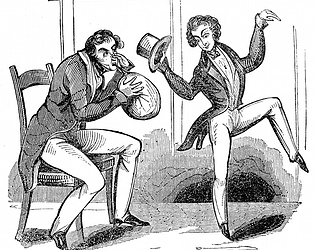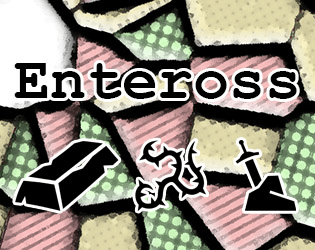❤️
scopperil
Creator of
Recent community posts
For me, The Quiet Year has been a touchstone for what a contemporary RPG can be or do. It creates keepsake maps, complex stories, and fascinating moments where players’ expectations and desires for the community pull with and against each other. I’ve seen it play well in gaming cons and in groups that have never played an RPG. Love it.
hi - I really like how this game will leave you with two generated maps, and a mystery to solve in how then turned into now. (Maybe in play or maybe in fan fiction afterwards.) I like the treasure/tension questions too, I think that's where interesting things will emerge from. Maybe also where expansions could come in, you could have more romantic or horror-related questions.
I've read the comments below where you're talking about neutral versus setting-y thoughts, and it reminded me of Annalise, where the setting-neutral vampire rules is accompanied by sidebars showing two example games playing out. For that game it shows how the rules work in practice, like your example, but also that it fits in different genres. It would have messed up your word count to do that here, of course!
I'm glad the example was there; early on I was confused about whether the fragile paths are crossing the edge our group has reached, or going across the cell we're looking at. (It was the part about forks in fragile routes that started my muddle, I think; should I just be reading it that three fragile-path hexagons around a common corner could have paths into each other?)
Your example, though, doesn't give an example of the epilogues. I'd have liked to have seen that.
I had a thought about 'advanced' questions while reading over - things you could only ask once the relevant scale was over 8, or something - that I've not managed to formulate into a sentence. Not much time before comments close though, so I might not. But something like Trophy, where once you're Ruined enough you can try to decrease your score on that scale. But then I'd be changing the balance between discovering and doing you've set up here. There's not really a question or a comment realised in this paragraph, I'm just gesturing at an area.
Thanks for making the game, I enjoyed reading it.
I see your Czege and Beltrán in the map, etc. Nice. As a UK reader though I'd struggle with applying childhood memories to the US-ish layout of the place. Is there much to stop me using a map of my nearest city, say? (I mean, try finding a block structure at https://www.visitchichester.org/sites/default/files/CITY_CENTRE_MAP.pdf - but I could see the cards still working with the shapes afforded here.)
Not sure if I'm shuffling the different backs of the memory cards together - it looks like there's people, events, places to remember, right? I'm thinking you do, but that means you can't use the information of the different backs to affect what you pick up; in which case, why have different backs? So other players can see what sort of memories you might play? (This is an interested question, not a rhetorical way of saying don't do it.)
I like the character generation very much. Zombie World does a similar thing, but this works it in with the game's tone (which is nicely consistent).
You're very clear in instructions! particularly in the facilitator's notes.
I'm late to adding notes - hence brevity! hope it doesn't come across rude - and I see there's lots below you've already seen. Not going to repeat any of them, except I think I want to endorse the part about wanting to see something happen to the given map as well as the creation of the new sketch.
bravo, and thanks for sharing.
Hi Sam,
I'm very into the art here, and I like what you've done to make that Microscope-style discovery geographical. (Have you seen "I'm sorry did you say street magic?", a recent zinequest game? You've come to some interesting similarities and differences in how the two games approach the same urge). You've got some great feedback already that I'll not repeat, but I did make a couple of other notes.
Your stats have very evocative names. I worry slightly that there might be an overlap between manipulate (plot) and foster dissent (sow), but I grew up with arguments over whether a certain action was INT or WIS and we always settled it. It feel to me like plot is preparatory, whereas sow is active, which would probably be enough to settle any arguments.
In the 'opposed rolls' section, I see a 'may' that leads to it being possible to have an opposed roll called for but no player wanting to do the opposition. What happens in that case? Fabulist is compelled to step in?
Is it possible to destroy a District that has a Haunt in? It seems like it would be yes, but the Haunt would somehow survive.
re your list of adjectives; you could have two D66 lists, keeping the options there but not giving blank lines for the other columns.
thanks for the entry, I enjoyed reading very much.
This entry is so clear in setting out its rules, it's exemplary.
I like very much the way the game has you create your own map, but work toward matching up with other people. Do we know what the odds are of wandering for ages without quite matching two items, though? if the rolls went the wrong way, could someone from the crew wander for ages without finding anyone?
I have a question about mood; as I understand the rules, a roll of 1,3,6 allows you to pick 1 or 6 as the mood, the lowest and highest numbers. That would make 3 and 4 the least likely moods possible; shouldn't they be the ones where everything is fine? Or can you pick the middle dice?
On the initial roll - is it roll 3 dice twice (and get two results, two moods) or roll 5 dice once (and get two results, one mood)? I feel like it's supposed to be the former, but can moods contradict each other?
The debrief is a valuable thing to have, I'm glad that's there.
How do I draw something on my Personal Map if it's beyond the Personal Map? I'm guessing I could see my shipmate's Volcano, and have, say, the word "Volcano" and an arrow pointing off the eastern edge?
And it's another game that lets me use a glue stick. Hurrah!
I don't have much to say beyond what you have already heard from the other reviewers. I do want to say I like games with glue in, though, there's something very satisfying about the physical building of the map. Are there enough strips for everyone, though? how many copies would we need to print off for sufficient routes?
The Odyssey references scattered through make me happy (and make me feel clever for spotting them). It's interesting that there are several wanderers, and I like that you have the possibility of discovering traces of each others' wanderings when someone dies. Is there a mechanic for saying hello if routes connect?
I like the picture, too. Thank you for the game!
I will always love a game that lets you build a murderboard, and that's what the overlapping truths and lies remind me of here. I'm interested that the maps don't really refer to geography, too, but to structuring of information. Given it's hard to spend time with each other and physical items you have me wondering if it's possible to play this over online node graph sites, or mind map software? (I've played some excellent Microscope on Miro, as it goes.)
I'll echo the thoughts about playing cards that others have said; it feels like there's a lot of information on a card that isn't being used (rank, suit, difference from the card it's played on). If you just had a limited stack of index cards, that would provide the same limit on resources you mentioned earlier, perhaps? But I like your blackjack idea more; lots of little clues or two big ones, risk of endangering yourself if you overshoot, that sort of thing.
The Le Carre tone is strong; I like the way you could slot in other mission types easily; it's good. Thank you for the game!
Hi - all your questions here are useful, and will make the next draft better - thank you. In terms of direct answers:
- damage die is supposed to be compulsory - it's dangerous to be around these large clumsy humans
- yes to examples. I'd run low on time but next pass they'll be there.
- number of players! good point. I'd guess 2-5? generally rpg groups suffer if they're bigger than that, right?
- I haven't play tested it as much as I'd like! the idea behind the odds, though, is that you should be able to make a choice between making things easier now or future but not both. That said, I'm more hippy narrative than crunchy odds-calculation in play style.
this manages to be flattering and insightful at the same time - thank you! I'm planning on coming back to the design for a more leisurely redraft, and I'll certainly use your thoughts here. In terms of direct answers:
- yes! I did think about an oracle deck but I did that in 2019 (and I was running out of time! maybe it's a stretch goal.)
- tone: I kind of hadn't decided, you're picking up on that. I'll address that in future.
I got unexpectedly emotional at this one, maybe because I never lived in one place long enough to have come up with this myself. I like the parallel games intersecting, the things that sort of don't matter but so totally do (the child's picture on the blueprints, the diary entry that might never be read). Easy to read while tonally captivating. Bravo.
edit to add: crikey, with 27 seconds to go?
The thing I like best about this is defining attitude to the Authority etc before defining what they are; sounds likely to bring out more surprises in play than the other way round. Also an unusual take on what maps are.
The legacy role of holding the other pencil is fun, too. I wondered if there could be more in the possession aspect, like you need to engage in some kind of ritual to take a pencil from the person who currently possesses it? I'm not entirely sure what I mean by that, but if these are significant marks then maybe ownership of the markers, and transferring it, can be expanded?
I'd play this. It's high-improv in the character side of things, but the nod to Microscope helps with that and I think the questions will offer footholds to the Conversation. (I'd hoped to play before commenting but didn't manage, sorry.)
I'm interested in not giving an actual size for the star map; the distances between the scraps would influence the narrative. A tiny map would force jostling, a big one would allow the structures to be entirely autonomous but allow for conflict at the edges of their spheres of influence, and I think I've just persuaded myself that you're right while typing this!
Ho studiato un po d'italiano ma non basta, allora: thank you for the English rules. I love the compass, and how that means you don't know what each islet means until you know how you get there; also that the islets are literally in different ages.
Not a gameplay query, but a motivation one: why have we decided to explore? why do we want to be changing the past? I feel like I'd benefit from either the instruction to push for my theme as a defining one of the new history, or for starting out with a promise I could keep to someone (or their descendants / ancestors).
mille grazie per il gioco.
This is my first time, so I'm not sure that I've made a good thing; but it is a finished thing, and that's my takeaway. I'm so prone to letting a thing accrete lots of potential ideas and dwell for so long it becomes inert, it's been really beneficial to have the start and end defined for me. No time to work out if the idea is worth going with, it's the best thing I've got so do as much as I can with it and bang, go.
sorry if stupid question, first time using itch. Where do I make this bit of the rules true?
All map-games must be shared and licensed under the Attribution-ShareAlike 4.0 International (CC BY-SA 4.0).




